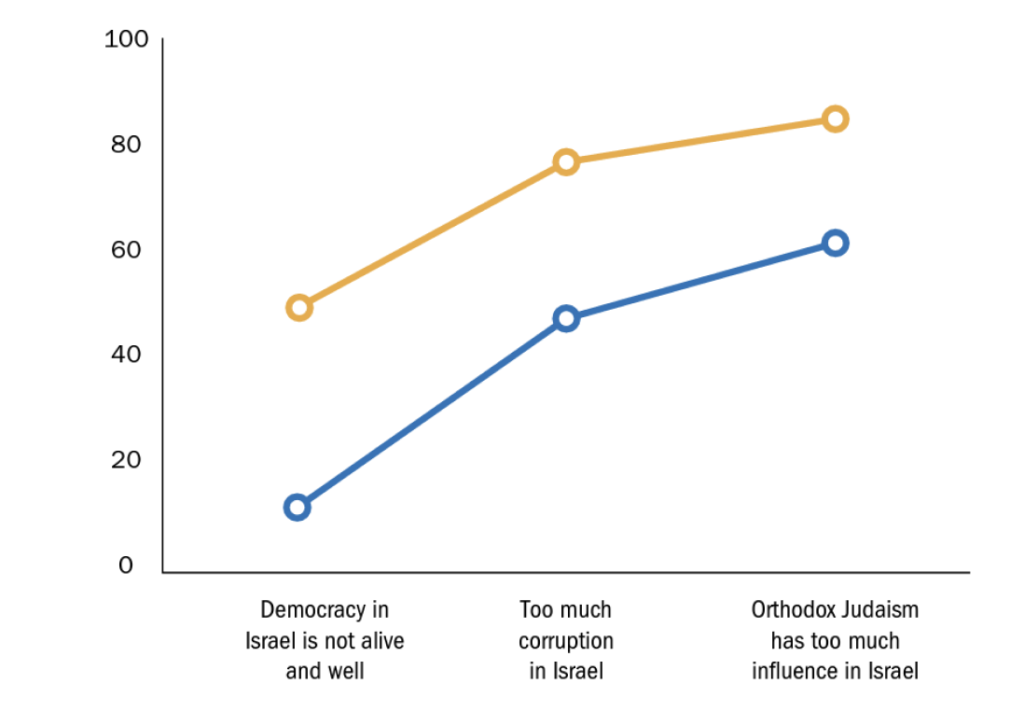In 2023, The Jewish Independent (previously Plus61J Media) initiated Crossroads23: Surveying Australian Jews on Israel to enable all Australian Jews to have their say in an international consultation project, Kol Ha’am – Voice of the People, initiated by the office of Israel’s president.
The survey aimed to provide input from a wide spectrum of Australian Jewry perspectives into the discussions that will take place at the Melbourne-based conference.
The survey produced by The Jewish Independent with Emeritus Professor Andrew Markus of Monash University produced a cleaned data sample of 1080 self-selected respondents in the week 30 May 2023 – 6 June 2023. The response alone is an indication that members of the community feel strongly about Israel and want to express their opinions. The survey results indicate a strong baseline identification with Israel: 90% agree that it is important that the Australian Jewish community maintains close ties with Israel, 88% feel a high level of personal connectedness with Israel, 86% agree that the existence of Israel is essential for the future of the Jewish people, 83% keep up with Israeli current events involving Israel and 80% indicate a high level of concern for Israel’s safety.
Results from Crossroads23 survey undertaken in June 2023, reveal continuing strong attachment to Israel among Australian Jews but a sharp decline in support for Israel’s policies.
Australian Jews retain a strong baseline identification with Israel, with 90% agreeing that it is important that the Australian Jewish community maintains close ties with Israel.
But there is a widespread lack of faith in the country’s current policies, particularly its commitment to democracy. Only 14% of Australian Jews surveyed agree the proposed judicial reforms are good for Israel, 85% think Orthodox Judaism has too much influence, and 77% think there is too much corruption in Israel.
Professor Markus said the strongest indication from the data is the sharp contrast between Australian Jews’ fundamental attachment to Israel and their attitude to its current policies.
Questions about attachment to Israel produced very high levels of positive response.
90%
it is important that the Australian Jewish community maintains close ties with Israel
88%
feel a high level of personal connectedness with Israel
86%
agree that the existence of Israel is essential for the future of the Jewish people,
83%
keep up with current events involving Israel
80%
indicate a high level of concern for Israel’s safety
But faith in Israel’s future is far from strong, with 57% indicating they are optimistic about Israel’s future, 42% pessimistic and 8% uncertain.
Judicial reform prompted the most negative responses with only 14% of the total sample approving of the proposals.
Responses are weaker still when the survey drills down to current issues, with less than half of participants happy with Israel’s democracy, political morality, or religious authorities.
Most striking is the sharp decline between the results of this survey and Gen17, the communal survey of Jewish attitudes conducted by Professor Markus for the Australian Centre of Jewish Civilisation at Monash in 2017.
In 2017, 76% of respondents thought Israeli democracy was alive and well, in this survey only 46% agree. Concern about political corruption has increased from 48% to 77% and concern about the influence of Orthodox Judaism from 62% to 85%. Asked about their changing feelings, 66% of respondents say they feel less confident Israel is a democratic country than they did five years ago.
Professor Markus said disaggregating the data showed strong validity in comparing the two surveys. Results on general questions about Israel were very similar while those current issues were quite different, suggesting the samples were similar and the changes are attributable to changed opinions.
79% agree 'It is acceptable for Jewish people who do not live in Israel to publicly express their views about the Israeli government and its policies.'

The issue of judicial reform prompted the most negative responses with only 14% of the total sample approving of the proposals. Even among the most favourable sub-group analysed, those who are affiliated with United Israel Appeal, approval of the judicial reforms is only at 24%. Concern about judicial reform was widespread with 98% of the sample saying they were following the issue to some extent and 76% doing so "a lot" or "quite a lot".
In relation to the Israel-Palestinian conflict, the survey finds a declining confidence in Israel’s policies.
57% of respondents agree less with Israeli policy than they did five years ago and a minority 41% believe that Israel’s control of the West Bank is vital for Israel’s security, a position strongly held by the current government. A weak majority of 56% believe a viable solution to the conflict is possible.
The survey indicates that Australian Jews feel a strong stake in Israel and a right to be involved: 79% agree “It is acceptable for Jewish people who do not live in Israel to publicly express their views about the Israeli government and its policies”.
Respondents believe Diaspora Jews have a particular stake in Israel’s policies on Jewish status (75%), recognition of pluralism (67%), and the role of Orthodox Judaism (62%). More than half also consider Diaspora Jews should voice their opinions on the situation of Palestinians in the West Bank/Gaza, women’s rights, judicial reform, LGBTQI+ rights and Arab citizenship rights. But there is little confidence that Diaspora Jews’ input will be respected, with 57% agreeing with the proposition that “Israelis do not care what Diaspora Jews think”.
The survey results were remarkably consistent across age groups and genders but diverged across political and religious lines. More conservative respondents – both political and religious – were more positive and optimistic about Israel’s direction.
But there was an alarmingly low level of optimism about Israel’s future among progressive respondents: 42% for those of Progressive or Conservative religious alignment, 28% for those of progressive political alignment, and only 21% among secular Jews.
The survey was distributed through The Jewish Independent, through affiliates of the Zionist Federation of Australia and through an advertisement in the Australian Jewish News.

